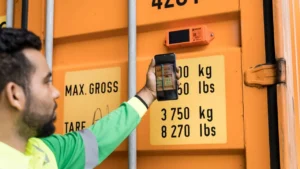On March 19, 2018 IBM presented its “5 in 5” technology predictions – an annual showcase of five pieces of breakthrough research that IBM believe with have lasting impacts of business and society in the next five years.
One of the main focuses of the presentation was Crypto-anchors – incredibly small pieces of embedded technology that, when combined with blockchain, can help combat pirated and counterfeit goods in the global supply chain.
These “tamper-proof digital fingerprints” come in a variety of forms, and help connected the digital blockchain record-keeping to the physical product, allowing the product’s origin and contents to be authenticated and matched to the blockchain record.
Read the “Rotterdam and IBM: Building the Port of the Future” for further reading on the developments IBM is making to the ports and shipping sector
One such form showcased at the presentation is the world’s smallest computer – measured at 1mm by 1mm, about the size of a single grain of rock salt.
Another form for a crypto-anchor is a piece of code in magnetic, edible ink placed upon medicine and pharmaceuticals, such as a malaria tablet.
The code reveals whether or not the product is legitimate when introduced to a water-based solution, which will allow medical professionals and patients to check their medication isn’t counterfeit.
This added step of security and authentication aims to help combat the fraud in the global supply chain, which IBM predicts costs the global economy upwards of £600 billion a year.
Andres Kind's presentation at IBM's “5 in 5”
Speaking at the live-broadcasted presentation, Andreas Kind, Manager of Industry Platforms and Blockchain at IBM Research, stated: “The root of the problem is actually the global supply chains have become very complex, with many participants across many regions around the world.
Crypto-anchors will half the number of counterfeit goods that are linked to health and safety.”









